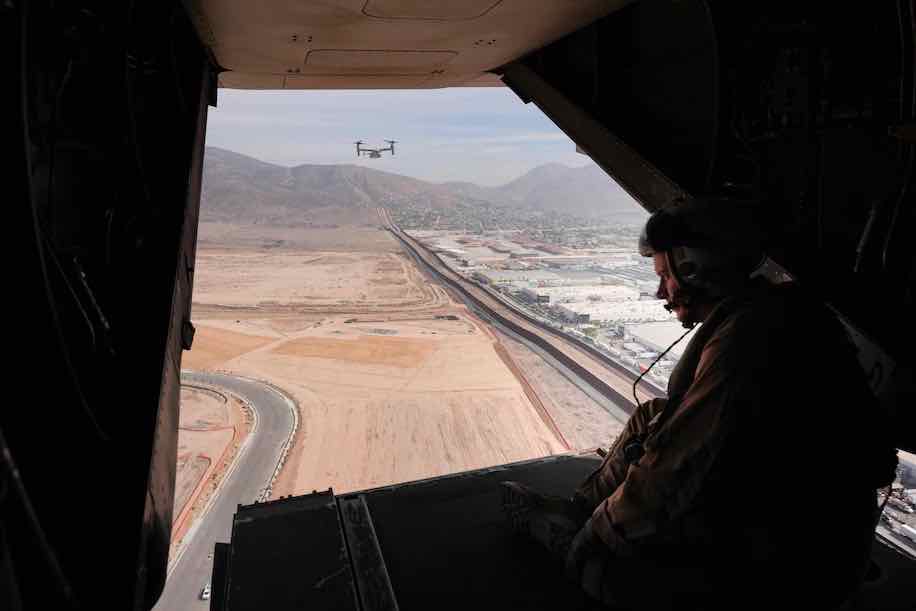February 18 2025
CIA targets Mexican cartels; underwater AI defense; severe flu outbreak; insurance versus natural disaster risk; Xi succession mystery;

1. CIA Expands Role in Mexico Drug War, Launches Covert Drone Program
2. A New Battleground: The Deep-Sea Defense of Critical Infrastructure
3. US Faces Worst Flu Season in 15 Years
4. Insurance Crisis Looms as Natural Disaster Risk Outpaces Premiums
5. Xi's Succession Question Looms Over China's Future
February 18, 1930: Pluto discovered
GET THE CITIZEN JOURNAL APP - FREE!
1. CIA Expands Role in Mexico Drug War, Launches Covert Drone Program
A. The Central Intelligence Agency is poised to take a larger, more aggressive role under President Donald Trump in the battle against Mexican-based drug cartels, devising and evaluating plans to share more intelligence with regional governments, train local counternarcotics units and possibly conduct other covert actions, according to people familiar with the matter. The expanded focus on cartels, which smuggle fentanyl and other narcotics into the United States, represents a new and potentially risky priority for the spy agency, which in recent years has made espionage against China, counterterrorism operations in the Middle East and Africa, and support for Ukraine after Russia’s 2022 invasion its main concerns. CIA Director John Ratcliffe intends to shift agency resources to its counternarcotics mission and apply insights from its two decades of tracking, infiltrating and disrupting terrorist networks to fighting the cartels, said a person familiar with his plans who, like others, spoke on the condition of anonymity because of the subject’s sensitivity and because the approach isn’t finalized yet.
B. The United States has stepped up secret drone flights over Mexico to hunt for fentanyl labs, part of the Trump administration’s more aggressive campaign against drug cartels, according to U.S. officials. The covert drone program, which has not been previously disclosed, began under the Biden administration, according to U.S. officials and others familiar with the program. But President Trump and his C.I.A. director, John Ratcliffe, have repeatedly promised more intense action against Mexican drug cartels. Increasing the drone flights was a quick initial step. The C.I.A. has not been authorized to use the drones to take lethal action, the officials said, adding that they do not envision using the drones to conduct airstrikes. For now, C.I.A. officers in Mexico pass information collected by the drones to Mexican officials.
Article Source: WaPo, NYT
2. A New Battleground: The Deep-Sea Defense of Critical Infrastructure
Deep under the sea, pipelines and cables carrying fuel, power and communications are strewn on the ocean floor like a central nervous system for the global economy. Huge stretches of these critical connectors lie unprotected in the murky depths—and vulnerable to attacks such as the 2022 sabotage of the Nord Stream pipelines that carry Russian natural gas to Europe under the Baltic Sea. Now, in the way that the use of drones has changed the conduct of land wars, artificial intelligence is about to change everything about how the deep sea is navigated and how critical underwater infrastructure is protected in wartime and against threats of terrorism. AI-empowered underwater systems are already changing seabed warfare and defense. Drones and anti-mine robots, working together with ships on the surface, underwater sensors and satellites, are being deployed by the military and governments. These systems to navigate, map, and provide underwater defense are increasingly using AI to analyze and synthesize diverse sources of data. In the next few years, industry and military users expect these systems to make huge advances.
Article Source: WSJ
3. US Faces Worst Flu Season in 15 Years
The US is dealing with an unusually intense influenza outbreak that has infected between 29 and 51 million people and hospitalized up to 820,000 since October. It's one of the worst flu seasons in 15 years, and some scientists are blaming post-COVID 'vaccination fatigue' and misinformation for the sudden surge. Several years of non-stop debate around COVID-19 may have led to vaccine hesitancy or avoidance, compromising the public's intent to get vaccinated for other health issues.
Article Source: Science Alert
4. Insurance Crisis Looms as Natural Disaster Risk Outpaces Premiums
Insurance is capitalism’s way of shielding us from the gods. It only works if we don’t shield ourselves from insurance itself. Wildfires in Los Angeles have put a spotlight on how regulations to prevent premiums from pricing people out of neighborhoods can tip into pricing them into risks that prove to be financially devastating. This branch of illusory capitalism extends beyond homes to other bedrock economic sectors, such as energy and transportation, as well as a bedrock risk, climate change. The result is a growing set of underpriced and nebulous contingent liabilities ready to open up like a sinkhole under everything from house prices to power supply when disaster strikes. Nowhere is the disconnect between risk and price clearer than in property insurance. Homeowners across the country aren’t paying nearly enough to meet the threat of more frequent and intense natural disasters. Dave Burt, an investor who spotted the subprime mortgage crisis, estimates the hidden potential damage from wildfires and floods to underinsured US housing at $1.7 trillion to $2.7 trillion. Matching that heightened risk would raise the average insurance premium by 29%, with some locales requiring far more.
Article Source: Bloomberg
5. Xi's Succession Question Looms Over China's Future
Donald Trump’s inauguration last month marked the latest peaceful transition of power in the US, a feat the country has navigated, with only a few hitches, for more than two centuries. In China, by contrast, the topic of leadership change is off-limits. Xi Jinping, China’s most powerful leader since Mao, has given no signs about who will succeed him. After more than a decade of political purges and centralisation of power, Xi faces no direct challenge to his authority and has signalled his intention to rule indefinitely. However, even in such a controlled environment, the issue of political succession is never far from the surface. As Xi enters the midpoint of his third five-year term in power, the question of who will succeed the 71-year-old who has led the ruling Communist party since late 2012 is becoming more urgent — both within China and abroad. Rarely mentioned in public, it is a subject that permeates every discussion about China’s future. While he dominates the party and has sidelined any immediate rivals, Xi, the princeling son of a revolutionary hero, still has to manage a delicate balance. To maintain the stability of the system, he needs to signal that there is a succession process that will eventually kick in — and which could be activated if something were to happen to him. But if he reveals too much, he risks becoming a lame duck, or worse.
Article Source: FT
February 18, 1930: Pluto discovered
See the Ad Astra Podcast! Released on Apple and Spotify around 10a CST.
Sponsors (click me!)









Sources
1. A https://www.washingtonpost.com/national-security/2025/02/17/trump-cia-mexico-cartels/
B https://www.nytimes.com/2025/02/18/us/politics/cia-drone-flights-mexico.html
2. https://www.wsj.com/tech/ai/ai-military-applications-mapping-aca7f486?mod=tech_lead_story
3. https://www.sciencealert.com/intense-flu-surge-gripping-the-us-is-the-worst-in-years-cdc-says
4. https://www.bloomberg.com/opinion/articles/2025-02-06/america-has-a-brewing-cost-of-crisis-crisis?sref=nXmOg68r
5. https://www.ft.com/content/4569ad76-f3e0-4fd9-8f6b-468f91ce32b3
